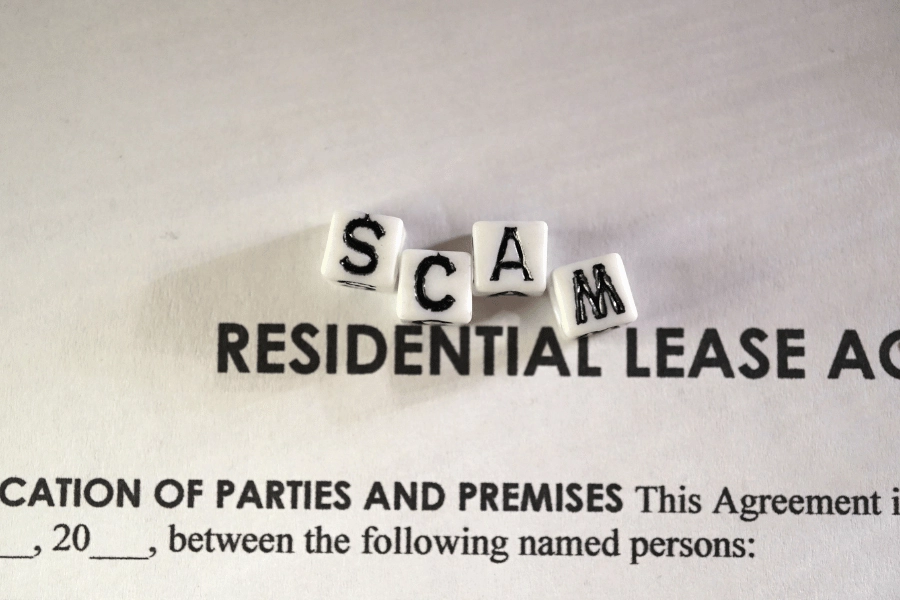Common Home Rental Scams
Curious about how to recognize and avoid rental fraud and scams? Continue reading to discover common home rental scams and increase your awareness.
Rental scams occur when property owners misrepresent themselves, the rental property in question, or the lease terms in an attempt to obtain money for a fraudulent offer.
Unfortunately, some individuals exploit the rental market by advertising either nonexistent or already rented properties, often requesting upfront payments from prospective tenants. To enhance their credibility, they may create fraudulent websites or post deceptive listings on reputable platforms.
By being aware of the warning signs in rental listings, you can protect yourself from these scams and successfully secure your ideal home. While rental scams have been around for quite some time, their prevalence is increasing due to technological advancements. Stay vigilant and informed to ensure a safe and satisfactory rental experience.
There are many ways to protect yourself from scammers and fraud. Keep reading to learn more about warning signs and what to do when you spot a rental scam.
Here are common home rental scams to help you spot and avoid rental fraud.
1. Rental Scams
Rental scams often involve fake listings for homes and apartments, tricking prospective buyers into making payments before they realize they are scams. Con artists use two main tactics to deceive unsuspecting buyers into a deal.
- Phantom Rentals: Scammers create rental ads with photos of an apartment or home that isn't for rent
- Ad Hijacking: Modify actual real estate listings and replace the realtor's contact info with their own
In both cases, scammers aim to convince potential renters to send money or provide sensitive information for a fraudulent rental agreement before they have the opportunity to see the property.
This is how they operate:
- Scammers post or hijack an ad for a property rental, usually at a tempting below-the-market price
- They will then communicate with potential tenants over the phone or online and create an urgency to try to rush the process, making excuses for why they can not see the property in person.
- Then, convince victims to send money for a security deposit, background check, application fee, or first month of rent.
- Once paid, scammers disappear, leaving victims without a home.
Scammers are double financially motivated but also can collect a significant amount of victims' personal information in the process, leading to more damage. Never give out all your personal information without noticing signs of scams.
2. Fake Rental Listings

Scammers often take online marketplaces that don't provide extra security or verification features. Large marketplaces that don't specialize in rental listings may also draw potential tenants with roommates who are looking for lower prices.
Here are some warning signs:
- Poor spelling and grammatical mistakes
- There is a lack of detail about the property and the address
- Poor-quality photos
- Extremely low rent
If something looks off, trust your instincts and move on to another one. It is not worth getting caught up in a scam when renting an apartment or co-living space.
3. Incomplete Leases
It's important to be aware that some scammers may draft unclear leases, potentially leading to fraudulent situations. A vague lease can enable landlords to modify crucial terms after signing the lease, which may expose renters to unexpected costs.
When your prospective landlord presents you with a lease, I encourage you to read it thoroughly and scrutinize any ambiguous clauses. If any sections are lacking in detail, kindly ask for clarifications or modifications to ensure a fair agreement.
Here are some warning signs:
- Vague wording
- Lack of specifics (address, rental amount, terms of liability)
- Request rent payment or security deposit before the lease is signed.

4. Long Applications Asking For Sensitive Info
Some rental scams aim to achieve two goals: financially defrauding you and stealing your personal information for identity theft. To protect yourself, avoid providing sensitive personal details until you have viewed the rental space and met the owner in person.
Warning signs:
- Sent a rental application that must be filled out before meeting up and viewing the rental
- Document requires that the applicant's date of birth, home address, credit card number, driver's license number, social security number,r or any other sensitive information
- More personal information than needed before you have been viewed the property
5. Request for Diposits Via Apps
It's important to be cautious when making payments, as scammers frequently request funds through irreversible methods such as wire transfers, cash, and certain apps like Zelle and Venmo.
A trustworthy landlord will typically accept deposits through established payment channels. To ensure your safety, please consider using debit or credit card transactions, as they offer added security and protection against fraud. Sticking to standard payment methods can better safeguard you from potential scams.
Some warning signs are:
- Request payment using a non-traditional payment method
- Makes excuses as to why you must pay by using a payment app
- Other suspicious payment requests include paying with gift cards or cryptocurrency

6. Fake Rental Agents
Some people do not see this type, but it has become more popular over the past few years because social media are fake rental agents. Scammers set up phony profiles, often on Facebook, and contact other users who are on the lookout for places.
If possible, avoid searching for housing and rentals on social media. If you decide to try a Facebook Marketplace listing, conduct thorough research to ensure the person behind the account is real and trustworthy.
Some things to look out for are:
- Receive an unsolicited message from someone on social media who claims to be a rental agent and offers you an appealing rental unit for a low price
- Find a listing that seems too good to be true
7. MIA Landlord
It is probably a scam if a landlord says they are out of the country, sick, or otherwise detained but still want first, last, and security deposit. The property in question is either bank-owned, a vacant vacation home, or empty for other reasons.
Regardless of where they live, a legitimate landlord or property manager will be willing to arrange for someone to meet them and show you the inside of the unit.
8. Copy and Paste Ad
When a genuine landlord creates an enticing description of a real vacant apartment and posts the listing online, scammers can exploit this by simply copying and pasting the details, often at a lower price.
This tactic, commonly referred to as the "clone scam," primarily targets those who may not be familiar with the area or are pressed for time, encouraging hasty deposits without an in-person visit.
One vital warning sign is an unusually high-security deposit, which has a strong potential for fraud. If you find yourself renting a property from afar, taking a few moments to conduct thorough research can greatly safeguard your interests.
Be sure to search the property address online for duplicate listings and consider contacting City Hall to confirm the ownership details. By being diligent, you can ensure a safer and more positive renting experience.
9. How to Avoid Rental Scams
Avoiding rental scams is important, especially in today's world. Before you jump the gun, there are some things you should do to avoid being scammed.
- Research the landlord or listing agent name and company and look up the agency on the Better Business Bureau's website (BBB)
- Make sure the apartment isn't listed for rent in more than one area
- Search the address on the Maps (check the street view images)
- Do a reserve image search of the photos in the ad
- Always visit and tour the unit in the listing
- Never pay for a tour
- Meet with the landlord in person
- Never pay a deposit or the first month's rent before seeing the property
- Check leases and agreements before signing
- Do not make rental payments or deposits through suspicious rental apps

10. If You Are In A Rental Scam...
Do not feel ashamed if you have fallen victim to a rental scam. Many people find themselves in this situation, and unfortunately, scammers are becoming increasingly sophisticated and harder to detect, particularly when they operate through online social media platforms.
Victims often choose not to report the incident out of embarrassment, which is entirely understandable. However, reporting the scam can help raise awareness of the issue and alert others who might become targets like you.
Here are some things you should do to minimize the damage of a rental scam.
- Freeze your credit card
- Try to reverse any payments that you have made
- Record all communications that you had with the scammer
- File a report with the Federal Trade Commission (FTC) and local authorities
- Report the scam listing to the FTC and the FBI's Internet Crime Complaint Center (IC3), as well as the platform used
- Monitor your credit closely
- Consider signing up for identity theft protection
Methodology
We created this guide using information from various sources and our own data on common rental scams and how to spot/avoid rental fraud.
We used the following sources to gather most of our information on common rental scams.
FAQS
How do you ensure you are not scammed on a rental property?
Some common things to keep in mind to know if you are being scammed are that they can't meet in person, you need to move in ASAP without seeing the property, they ask for money before signing a lease, the price is too good, and the listing has issues.
How do you tell if a property management company is legitimate?
If you are working with a property manager or leasing agent, check their licensing status on the department website for your area. If licensed, look for any restrictions or red flags related to their practice.
How to spot a fake lease agreement template?
When reading your lease, you need to look for clues and read it fully. Some things to notice that may mean it is fake are that it requires a large deposit, pressures you to sign, and offers no way out. You may also notice that the landlord requests postdated checks or adds added fees.
Is it normal to pay a deposit before seeing the property?
If you are asked to pay a security deposit or even the first month's rent before you view the property, you are likely dealing with a scammer.

Common Home Rental Scams - The Bottom Line
Scammers operate in various industries, including the rental market. No matter how prepared you are, scammers will always be looking for easy targets, making it essential to learn how to protect yourself from becoming a victim.
A little caution can go a long way, so shielding yourself from any scam is important. Rental scammers are more common than you might think and can be difficult to identify. As you search for your next place, look for these red flags to help you avoid potential scams.
If anything seems off and you are unsure, there are many ways to report scammers to help with future damage for you and other targets. The Internet Crime Complaint Center is a partnership between the FBI and other protective government agencies there to help with online crimes as well as the Federal Trade Commission. Do not be afraid to reach out and report.
If you are considering moving or selling, contact us or visit our website. Our team at Raleigh Realty is here to help you with any home buying or selling needs.



